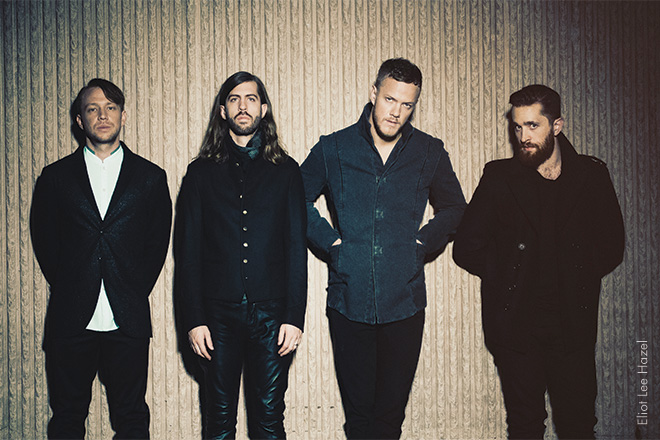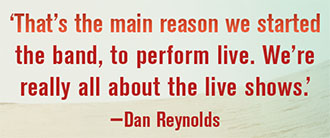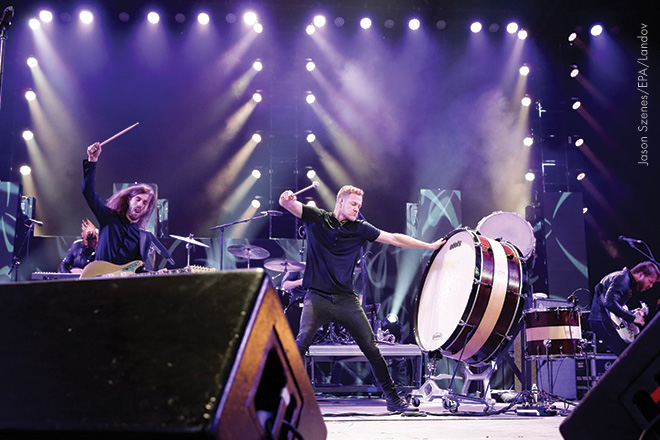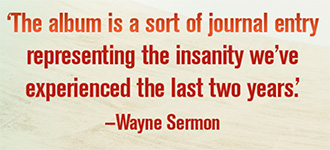Imagine Dragons finds success takes some getting used to
Sudden fame can be a double-edged sword. Just ask Imagine Dragons’ frontman Dan Reynolds. “It sounds cliché,” he says, “but I never got into rock ’n’ roll for fame or drugs or girls. For me, rock ’n’ roll was about people doing what they wanted to do and saying what they wanted to say. I’m hardly a typical rock star. I have a wife and a 2-year-old daughter, and I love being home with them. It so happens I also love music. I’m trying hard to balance those things.”
So far, so good. Vaulting into the limelight two years ago with the smash hit, “Radioactive,” Imagine Dragons has since garnered a reputation as one of rock’s brightest hopes. In an era when pre-fab pop dominates, the group scored big with a back-to-basics approach. Last year “Radioactive” earned the group a Grammy for Best Rock Performance. “We have guitars and drums and bass,” says Reynolds, “so people call us a rock band. But I love big, poppy melodies and I’m not going to apologize for that. People can call the music what they want.”
Imagine Dragons’ journey began four years ago, when Reynolds was introduced to guitarist Wayne Sermon. A Berklee College of Music graduate, Sermon in turn recruited two fellow Berklee alums, bassist Ben McKee and drummer Daniel Platzman. The band rigorously worked the club and casino scene in Las Vegas—Reynolds’ hometown—while releasing a series of independent EPs. They paid their dues. “The ding-ding-ding from the slot machines was louder than the tiny speakers they gave us,” recalls Reynolds. “But it provided enough money to pay the rent and eat Top Ramen or Taco Bell.”
The hard work paid off in 2011 when British producer Alex da Kid helped negotiate a deal with Interscope Records. On Night Visions,
the band’s full-length debut, the Grammy-winning soundman subtly garnished Imagine Dragons’ musical approach. “He told us to just sit down and write what we’d been doing,” says Reynolds. “It immediately felt comfortable. He wasn’t trying to make us into some band that existed in his mind. He understood we were very percussive and rhythm-based, so he helped us capitalize on that.”

Night Visions was a monumental success. Fueled by “Radioactive,” the album shot to No. 2 on the Billboard 200 and has sold nearly 4 million copies worldwide. “Radioactive” now stands as the best-selling rock song in U.S. digital history. Another single from the album, “Demons,” topped the Billboard Pop Songs chart and has sold more than 4 million in the U.S. alone. For Imagine Dragons, the past two years have been marked by a whirlwind of honors, TV appearances and relentless touring.
“I had no idea the band would blow up like it has,” says Reynolds. “It’s been nothing like I thought it would be. It’s been eye-opening, life-changing, and in some ways very hard to deal with. Everything has surprised me.”
Imagine Dragons’ new album, Smoke + Mirrors, frames many of those issues in richly melodic and sophisticated settings. While da Kid helped on two songs—“Gold” and “Dream”—the band took on the production reins for the bulk of the record. Working in their new home studio, they pored through a trove of song sketches—most written by Reynolds while the band was on tour. “A lot of the vocals were recorded into my laptop with a cheap USB mic in my hotel room,” he reveals. “Many of those takes captured the spirit of the moment when the song was written.”
High points include the anthemic, autobiographical “I Bet My Life,” the stately, bare-bones ballad “It Comes Back to You,” and “Shots,” a stormy arena rocker that brings to mind prog legends Yes blended with ’80s hit-makers Big Country. Reynolds is quick to acknowledge the band’s inspirations, but politely deflects questions about musical direction and style.
“It’s funny,” he muses. “People say, ‘What is Imagine Dragons? Are they a rock band? Alternative? Pop?’ We laugh at all that—labels aren’t a concern, aren’t something we think about. We’re just creating music that inspires us.” During preparations for their summer tour, Reynolds and guitarist Sermon spoke to us about the new album, the group’s influences, and the tribulations of sudden fame.
Did you have a goal for the album?
SERMON: When you start thinking in terms of strategy—how you want the album to sound—that’s a dangerous game, at least for us. We didn’t have time to think about what kind of album we wanted to make. We’re habitual writers, so we just wrote while we were on the tour bus, in a green room, at a venue or in an airport. The album is a sort of journal entry representing the insanity we’ve experienced the last two years. That’s true for every member of the band, and especially so for Dan, as the lyricist.
REYNOLDS: I felt the best thing to do was to let the music be an outlet—and whatever came out, came out. I had no interest in re-creating “Radioactive” 10 times over, or in doing something that shows the more artsy side of the band. I wanted to put all that out of mind, not have any pressures—and just create. Our lives have been turned upside down in the past two years. I tried to write honest songs that spoke to where my life is at the moment.
Was having lots of songs challenging?
REYNOLDS: No question. I’m a homebody, so after shows I go to the hotel room and write, all the time. People think it’s great that we have all these songs, but it’s really difficult. There’s so much material to pore through, deciding which songs work together and tell a cohesive story—but also making sure there’s variety. Plus it’s not always easy to judge your own work, to determine which songs should make the album.

Did one song set the tone?
REYNOLDS: “Smoke and Mirrors”—the title track. When I wrote that I knew it was the theme of the record. It spoke to thoughts I was having, my emotional state and my view of the world. It sums things up, although it doesn’t offer any answers. The album has recurring themes having to do with trying to start over, feeling regret and feeling sorry about certain things. It’s like I needed to wipe the slate clean and start anew.
Why does Las Vegas matter to the band?
SERMON: We wouldn’t be a band if it weren’t for Las Vegas. As a young band we traveled to L.A., wanting to get into that scene. But L.A. is so inundated. I don’t know that we could have found our musical voice there or become something unique. It made us really grateful for Las Vegas. There are tons of places to play here. We were able to do casino and lounge gigs and actually make a meager living. It wasn’t big money but at least we didn’t have to get second jobs.
All of you studied at Berklee, except Dan.
SERMON: There are two trains of thought about how you approach music. There’s the traditional, intellectual route where you study something formally, and then there’s the instinctual route. I think the combination works really well. Dan brings that instinctual thing to the table. The main advantage of training is that we can come up with things faster. But I’m glad Dan doesn’t have formal training, and the band sounds better for it.
Do you share common influences?
REYNOLDS: There are core influences we all share. We love classic rock, and we love great singer-songwriters from the past 40 years—artists like Cat Stevens, Paul Simon, Billy Joel, Elton John, Willie Nelson and the Beatles. We love great melodies. From that point, it branches out. I listened to a lot of ’90s hip-hop—like Tupac and Biggie—and also got into ’90s grunge. The other guys were into a lot of classical music and jazz. And Daniel listens to a lot of old country music.
 SERMON: It’s sounds cliché, but the Beatles were the best band in the world. I don’t remember a time when I didn’t know who George Harrison was. I would go into my dad’s studio—he had an audiophile-quality record player—and listen to the Beatles. George Harrison’s playing was so tasteful—always exactly what needed to be there, never any fluff. Tom Scholz [of the band Boston] is one of my favorite players as well. I love the sounds Scholz gets and his melodic approach to solos. It was never about finger-tapping or shredding or how many notes he could play. Instead it was about powerful melodies that sounded good.
SERMON: It’s sounds cliché, but the Beatles were the best band in the world. I don’t remember a time when I didn’t know who George Harrison was. I would go into my dad’s studio—he had an audiophile-quality record player—and listen to the Beatles. George Harrison’s playing was so tasteful—always exactly what needed to be there, never any fluff. Tom Scholz [of the band Boston] is one of my favorite players as well. I love the sounds Scholz gets and his melodic approach to solos. It was never about finger-tapping or shredding or how many notes he could play. Instead it was about powerful melodies that sounded good.
Describe the guitar’s role in Imagine Dragons.
SERMON: Often it’s about adding a texture here and there. Sometimes there’s a part where people don’t even know it’s a guitar. That’s especially true of the new album, although at the same time there’s more guitar on this album than on the first. As we were writing I would send Dan tons of guitar parts—record them and put them on a USB drive. He would build songs around them. That’s how a lot of songs began—“Shots,” “It Comes Back to You,” and “I Bet My Life.” There are occasional moments where I shine through a bit more—“I’m So Sorry” being an example. Rather than providing a texture, I’m sort of the driving force on that song. “Hopeless Opus” is another one.
Ever wish there were more opportunities for leads and solos?
SERMON: No. I’m not the type of player who ever says, “Let’s put a solo here.” I have to be pushed to go in that direction. I’m more comfortable with the textural aspect. The guys basically made me do that solo in “Hopeless Opus.’’ I was just messing around. I switched on a fuzz pedal, turned it all the way to “10,” and soloed over the chorus. The guys were like, “Whoa, do that again—and record it this time!”

Does having your own studio make the creative process more collaborative?
REYNOLDS: It does. I wrote more than 100 demos by myself, and then there were those songs where Wayne came up with a guitar lick and I built around those. There were also two or three songs that our drummer sent me, and I built around those as well. That’s how it typically works. Once we’re in the studio it becomes completely collaborative—everyone listens to the demos and we choose those that fit together. Everyone picks their favorites and we select the ones we agree on. Then we tear those songs apart and rebuild them, over and over. The bass parts change, the drum parts change, and it’s the same with the guitar. It’s kind of like editing a paper.
Did you consider how the songs would translate live?
REYNOLDS: That was a main consideration. All that editing in the studio was done in a live setting, to see how the songs felt on real instruments, how they felt as played by the full band. That was a huge factor in determining which songs made the cut. That’s the main reason we started the band, to perform live. We’re really all about the live shows. We wanted to make sure the songs stood strong on that level, even before they stood strong on an album.
 How do you take care of your voice?
How do you take care of your voice?
REYNOLDS: Four years ago I had a polyp removed from my vocal cords. Ever since then I’ve taken steps to make sure that doesn’t happen again. Following the procedure I took vocal lessons—something I had never done before. Before that I was just kind of screaming my way through things. I have vocal exercises I go through every day, and I do warm-ups and warm-downs for every show. I changed my diet and I don’t eat anything for four hours before I sleep. It’s all about adhering to that discipline.
Any surprises in store for the upcoming tour?
REYNOLDS: We’re planning to do some interesting things. We have a larger budget, and that will allow us to bring some things to life. We’ve always been into creating a show that’s not just four guys playing on a stage, but something that tells the story of a record, where you walk in and understand the vibe and the theme of it, and see it played out musically and visually. We’re working with a production company that’s pushing the boundaries of what live production can be. It’s fun to be able to do that for the first time. With the first album, everything was blowing too fast to think about those things.
What’s surprised you most about success?
SERMON: We’re able to do what we do on a much larger scale, and that makes us happy. We wake up grateful every day for that. But the dynamic between the four of us is the same as it’s always been. It’s just four of us making music. We act the same and we have the same strengths and hang-ups we’ve always had. Doing this on a larger scale is the only thing that’s changed.
REYNOLDS: Everything has happened so fast. I’m truly grateful for all of it, but I’m also not quite sure what my identity as a person is right now. That’s what this record is about—exploring that loss of identity and trying to wipe the slate clean. It’s about either finding out who that person is, or else being happy not knowing who he is, for the rest of my life. I’m still wrapping my head around that. M
By Russell Hall





comment closed